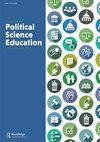溺爱还是订婚?向Z世代学生传授政治宽容
IF 0.6
Q3 POLITICAL SCIENCE
引用次数: 1
摘要
抽象评论家喜欢称Z世代的学生(1995年出生的学生)“娇惯”,抗拒他们不同意的想法。大学里一系列引人注目的抗议活动给人的印象是,Z世代在政治上不容忍那些与他们意见相左的人。与此同时,Z世代是一个更加多样化、受教育程度更高、政治更加活跃的一代。鉴于政治两极分化,教Z世代学生政治宽容是一项挑战。本文提出了一种在《政治概论》课程中教授政治宽容的方法。该课程以认知科学和神经科学为概念基础,帮助学生理解政治中理性决策的局限性以及情绪和身份的中心性。这篇论文每天都在讲述一种教授政治宽容的方法,包括一项测量学生政治宽容的原始调查。调查显示,在完成调查的69名Z世代学生中,只有30%至34%的人在政治上不容忍“最不喜欢”的方法。此外,学生们对进步的言论、书籍和老师更加宽容。本文得出了关于向Z世代学生教授政治宽容的结论,并对未来的研究提出了建议。本文章由计算机程序翻译,如有差异,请以英文原文为准。
Coddled or Engaged? Teaching Political Tolerance to Generation Z Students
Abstract Critics like to call students in Generation Z (those born in 1995 onward) “coddled” and resistant to ideas that they disagree with. A series of high profile protests at universities have led to the impression that Generation Z is political intolerant of those who they disagree with. At the same time, Generation Z is a more diverse, more educated, and more active political generation. Given political polarization, teaching Generation Z students about political tolerance presents challenges. This paper presents an approach to teach political tolerance in an Introduction to Politics course. Grounded conceptually in the cognitive and neurosciences, the course helps students understand the limitations of rational decision-making in politics and the centrality of emotion and identity. The paper presents a day-by-day recount of an approach to teaching political tolerance including an original survey that measures student political tolerance. The survey indicates that only 30% to 34% of the 69 Generation Z students completing the survey were politically intolerant using a variation of the “least preferred” approach. Additionally, the students were more tolerant of progressive speech, books, and teachers. The paper draws conclusions about teaching political tolerance to Generation Z students and includes suggestions for future research.
求助全文
通过发布文献求助,成功后即可免费获取论文全文。
去求助
来源期刊

Journal of Political Science Education
POLITICAL SCIENCE-
CiteScore
1.80
自引率
36.40%
发文量
69
期刊介绍:
The Journal of Political Science Education is an intellectually rigorous, path-breaking, agenda-setting journal that publishes the highest quality scholarship on teaching and pedagogical issues in political science. The journal aims to represent the full range of questions, issues and approaches regarding political science education, including teaching-related issues, methods and techniques, learning/teaching activities and devices, educational assessment in political science, graduate education, and curriculum development. In particular, the journal''s Editors welcome studies that reflect the scholarship of teaching and learning, or works that would be informative and/or of practical use to the readers of the Journal of Political Science Education , and address topics in an empirical way, making use of the techniques that political scientists use in their own substantive research.
 求助内容:
求助内容: 应助结果提醒方式:
应助结果提醒方式:


